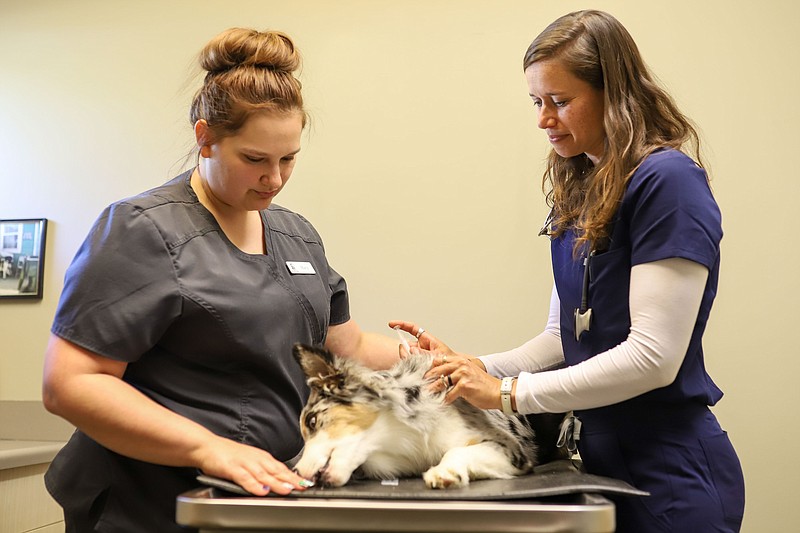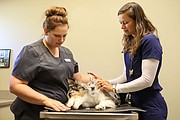The Chattanooga area is seeing an unprecedented number of cases of canine respiratory illness, particularly canine influenza, leading veterinarians to recommend people keep their dogs away from other dogs and a local animal shelter to limit its intake of new dogs.
"I would definitely have to call this an outbreak," Marisa Shulman, medical director of Riverview Animal Hospital, said by phone. "In Chattanooga at least, this is way more than we usually see."
Shulman said she became aware of an increase in cases in Middle Tennessee through her role on the board of the Tennessee Veterinary Medical Association before the outbreak spread to Chattanooga.
Riverview Animal Hospital does not test every dog that comes into the office. However, dogs tested there and at other facilities across the city reveal an increase in cases of influenza as well as other respiratory viruses and illnesses caused by different bacteria, Shulman said,
Jim Hammon, a veterinarian at Northgate Animal Hospital, said his office is seeing six or seven dogs with respiratory illnesses a week instead of the typical six or seven cases a month.
In a typical year, canine influenza is less common than tracheobronchitis, aka kennel cough, which is caused by Bordetella bacteria or parainfluenza virus, he said.
The most common strains of canine influenza are H3N8, which was first identified in canines in 2004 -- when it was believed to have jumped from horses to racing greyhounds -- and H3N2, an avian flu first identified in canines in 2015, Hammon said.
Both strains were identified through testing of coughing dogs at Northgate Animal Hospital, as well as bacteria and viruses that are targeted by the kennel cough vaccine.
The difference between kennel cough and canine influenza is indistinguishable based on clinical signs, as the symptoms of both conditions include coughing, high fever and runny nose, Hammon said.
Most cases of canine influenza are short-lived, lasting between 10-21 days, and are treated symptomatically with antibiotics and cough medicine, he said.
But in about 10% of cases, dogs experience more severe symptoms, such as high fevers of 104-105 degrees, that require more supportive care. A much smaller share of cases require hospitalization or IV fluids, Hammon said.
He suggests people with coughing dogs see their vet, who can prescribe the appropriate treatment to be administered at home.
Hammon also recommends making sure dogs are up to date on their Bordetella and parainfluenza vaccine. Although there is a shortage of the canine influenza vaccine, which protects against both strains, dogs that are boarded regularly should receive the vaccine if their veterinarian has it available, he said.
During the outbreak, Hammon recommends boarding dogs only when necessary and avoiding congregations of dogs at dog parks or scheduling grooming appointments.
The Humane Educational Society is limiting its intake of dogs during the outbreak because infected dogs must remain in treatment for two weeks and can't be adopted out as quickly.
"This is highly contagious, and we see symptoms fairly quickly after exposure," Executive Director Rebecca Bryan said by email, adding that because the shelter is able to begin treatment on the first day symptoms begin, the severity of the condition for shelter dogs is relatively low compared to what private practices report.
She said that's likely due to pet owners waiting until the flu worsens to take their dogs to the vet.
"Please assume that if your dog has been around other dogs, especially in dog parks, boarding kennels or day care, that they will likely be exposed if they haven't already," Bryan said.
The shelter started seeing more cases of canine respiratory illness a couple of weeks after local vets reported seeing an increase in cases, she said.
"We anticipate that people will continue surrendering and finding dogs that are infected, and the virus will be re-introduced to the shelter until the outbreak dissipates in the general community," Bryan said. "Luckily, we have a great team that responded immediately to implement protocols for managing the disease, and we're already seeing decreases in new cases."
Contact Emily Crisman at ecrisman@timesfreepress.com or 423-757-6508.

